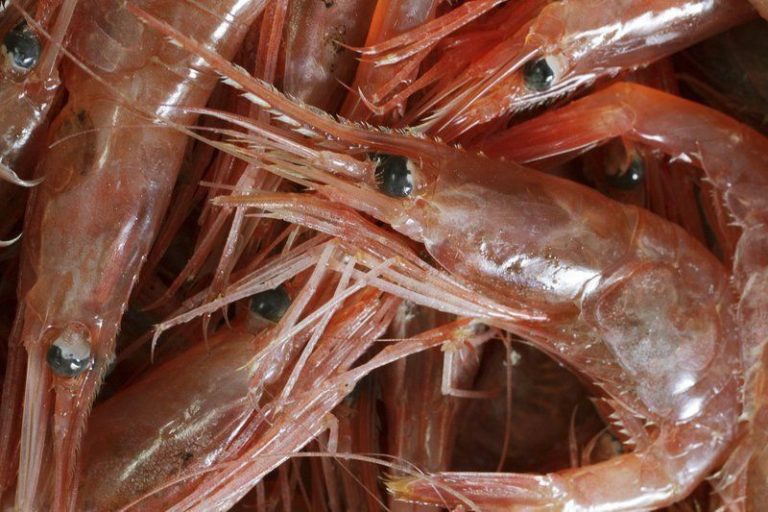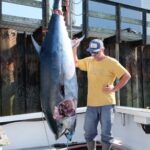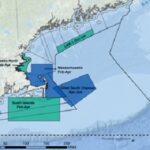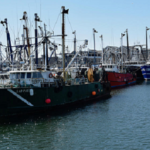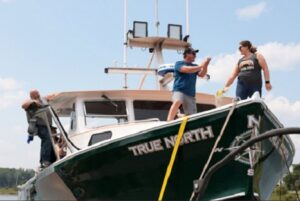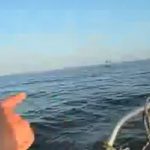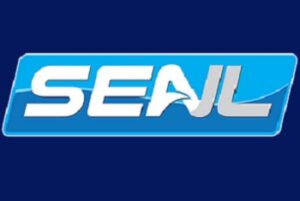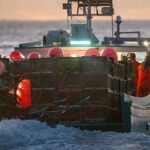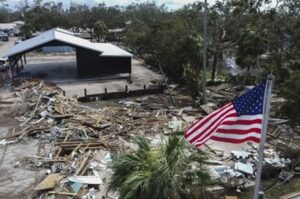Monthly Archives: September 2015
Nearly four times as many tuna landed on P.E.I. than same time last year
 In 2014, the Island fleet had landed 28 fish, weighing 6.988 tonnes by September 3. By September 3 this year, Department of Fisheries and Oceans numbers indicate 107 tuna, weighing approximately 25 tonnes, have already made their way to buying stations. Good August weather might partly explain the higher landings so far this year suggests Doug Fraser, a member of the P.E.I. Fishermen’s Association’s tuna advisory committee. P.E.I benefitted from a in previous years, too, but this year it is being handled separately. Read the rest here 09:25
In 2014, the Island fleet had landed 28 fish, weighing 6.988 tonnes by September 3. By September 3 this year, Department of Fisheries and Oceans numbers indicate 107 tuna, weighing approximately 25 tonnes, have already made their way to buying stations. Good August weather might partly explain the higher landings so far this year suggests Doug Fraser, a member of the P.E.I. Fishermen’s Association’s tuna advisory committee. P.E.I benefitted from a in previous years, too, but this year it is being handled separately. Read the rest here 09:25
FWC tightens rules on use of certain stone crab traps
 State fishery managers have removed a loophole that gave some unscrupulous commercial trap fishermen a leg up on fellow fishermen and had serious impact on the lucrative spiny lobster fishery, which is centered in the Florida Keys. Bycatch of lobster in stone crab traps has always occurred, and vice versa. But recent changes to both fisheries have created additional motivation for fishermen to shift their effort from targeting stone crab to lobster, the FWC biologists said. Read the rest here 08:32
State fishery managers have removed a loophole that gave some unscrupulous commercial trap fishermen a leg up on fellow fishermen and had serious impact on the lucrative spiny lobster fishery, which is centered in the Florida Keys. Bycatch of lobster in stone crab traps has always occurred, and vice versa. But recent changes to both fisheries have created additional motivation for fishermen to shift their effort from targeting stone crab to lobster, the FWC biologists said. Read the rest here 08:32
Fishing vessel groundings prompt alert on fatigue dangers
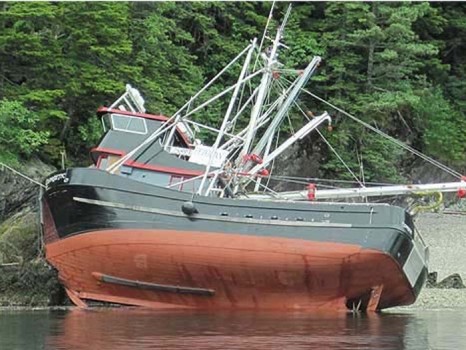 The U.S. Coast Guard has issued a safety alert following an increase in the number of groundings on Alaskan shorelines involving uninspected commercial fishing vessels. Since July 14, 2015, a total of 16 reported groundings have occurred. In a number of investigations, it was learned that the captain or crewmembers on the vessel had fallen asleep at the wheel after working extensive hours over several days. The safety alert (No 8-15 “Asleep at the wheel: When fatigue catches up”) says that fatigue may have been a causal factor in many of these groundings. Read the rest here 17:08
The U.S. Coast Guard has issued a safety alert following an increase in the number of groundings on Alaskan shorelines involving uninspected commercial fishing vessels. Since July 14, 2015, a total of 16 reported groundings have occurred. In a number of investigations, it was learned that the captain or crewmembers on the vessel had fallen asleep at the wheel after working extensive hours over several days. The safety alert (No 8-15 “Asleep at the wheel: When fatigue catches up”) says that fatigue may have been a causal factor in many of these groundings. Read the rest here 17:08
Summer season was the perfect storm for some Southeast trollers
 “We had small fish, poor price, bad weather, and also no fish or very few fish,” said Matthew Donohoe, a fishermen from Sitka. He has been fishing for nearly 40 years and said it’s been the strangest Coho season he’s ever seen. “That all added up to quite a whammy for the troll fleet.” Dale Kelley is the Executive Director of the Alaska Trollers Association. She said this is the year that she has dreaded. “This is the year where our King salmon quota is too low, and Coho are coming in about average with a poor price and that is about, it’s one of the worst scenarios,,, Read the rest here 16:44
“We had small fish, poor price, bad weather, and also no fish or very few fish,” said Matthew Donohoe, a fishermen from Sitka. He has been fishing for nearly 40 years and said it’s been the strangest Coho season he’s ever seen. “That all added up to quite a whammy for the troll fleet.” Dale Kelley is the Executive Director of the Alaska Trollers Association. She said this is the year that she has dreaded. “This is the year where our King salmon quota is too low, and Coho are coming in about average with a poor price and that is about, it’s one of the worst scenarios,,, Read the rest here 16:44
South Atlantic – More no-fishing zones unjustified – Rep. Steven Goldfinch
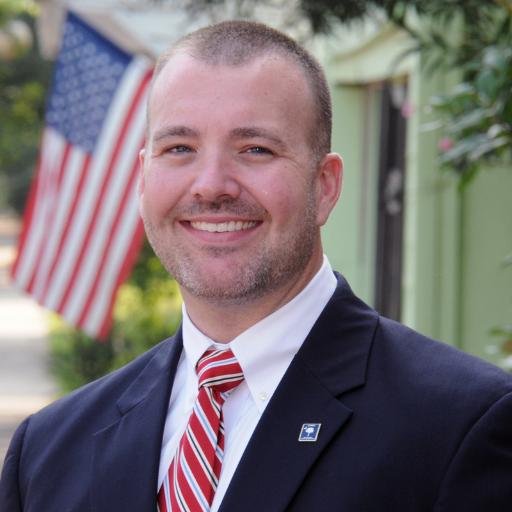 Of the 59 snapper-grouper species managed by the SAFMC, just six are now considered experiencing overfishing or are overfished. None of the mandatory fishery rebuilding plans require any additional closed fishing areas for success. Until the SAFMC and NOAA can properly assess spawning activity and other fishery biological information within the existing MPAs, it’s wrong and unfair to fishermen and fishing communities to close more fishing areas without solid justification. Read the rest here 16:19
Of the 59 snapper-grouper species managed by the SAFMC, just six are now considered experiencing overfishing or are overfished. None of the mandatory fishery rebuilding plans require any additional closed fishing areas for success. Until the SAFMC and NOAA can properly assess spawning activity and other fishery biological information within the existing MPAs, it’s wrong and unfair to fishermen and fishing communities to close more fishing areas without solid justification. Read the rest here 16:19
Niaz Dorry of Northwest Atlantic Marine Alliance – Top 10 Myths About Seafood, Fisheries, and Marine Conservation
 To me, from the start it was these similarities that were the untold story of the ocean and fisheries work. Some of the items on the list – like #1 – were clear to me from day one. Others emerged as I learned more. My convictions about this list are a manifestation of my instincts that are often reinforced through experience and information. 10. We need stability, so we can’t change the current system. This is code word for maintaining status quo. In some ways, they are right; we can’t change the current system. At least not in ways that will matter, so at some point we will need to start from scratch. It’s like a bad batch of dough. Nothing you do is going to fix it. In the end, you’ll have a loaf of brick. Time to start anew. And this time,,, Read the rest here 15:17
To me, from the start it was these similarities that were the untold story of the ocean and fisheries work. Some of the items on the list – like #1 – were clear to me from day one. Others emerged as I learned more. My convictions about this list are a manifestation of my instincts that are often reinforced through experience and information. 10. We need stability, so we can’t change the current system. This is code word for maintaining status quo. In some ways, they are right; we can’t change the current system. At least not in ways that will matter, so at some point we will need to start from scratch. It’s like a bad batch of dough. Nothing you do is going to fix it. In the end, you’ll have a loaf of brick. Time to start anew. And this time,,, Read the rest here 15:17
Cheers & Jeers, Treasures that washed ashore this week – Cape fishermen deserve fair share
 While many commercial fishermen, especially big-boat crews out of New Bedford and Gloucester, blame the federal government for the dismal state of the New England fishing industry, the Cape Cod Commercial Fishermen’s Alliance prefers to work with the federal government to manage sustainable fisheries. For example, the Alliance wants to help the feds collect accurate information about fish stocks to help improve fisheries science. In other words, they do not point fingers; they are problem solvers. Which is one reason why we think,,, Read the rest here 11:32
While many commercial fishermen, especially big-boat crews out of New Bedford and Gloucester, blame the federal government for the dismal state of the New England fishing industry, the Cape Cod Commercial Fishermen’s Alliance prefers to work with the federal government to manage sustainable fisheries. For example, the Alliance wants to help the feds collect accurate information about fish stocks to help improve fisheries science. In other words, they do not point fingers; they are problem solvers. Which is one reason why we think,,, Read the rest here 11:32
Federal regulators are eyeing a possible moratorium on eel fishing in Delaware waters
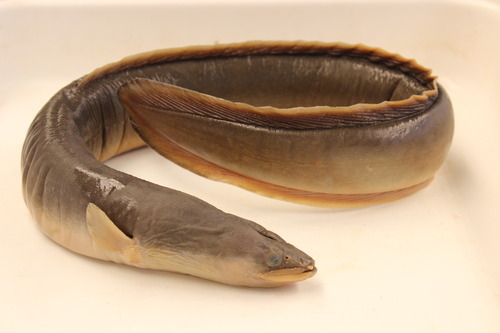 The National Marine Fisheries Service is reviewing a referral from the Atlantic States Marine Fisheries Commission that found Delaware out of compliance with the interstate management plan for American eel, whose numbers are depleted.If the national agency determines that Delaware failed to carry out its responsibilities, and that the measures the state failed to implement are necessary for conservation, then it must declare a moratorium on eel fishing in Delaware waters. A determination must be made by Sept. 18. link 10:24
The National Marine Fisheries Service is reviewing a referral from the Atlantic States Marine Fisheries Commission that found Delaware out of compliance with the interstate management plan for American eel, whose numbers are depleted.If the national agency determines that Delaware failed to carry out its responsibilities, and that the measures the state failed to implement are necessary for conservation, then it must declare a moratorium on eel fishing in Delaware waters. A determination must be made by Sept. 18. link 10:24
Lobster Fisherman loses hand in lobster boat accident
 A 51-year-old lobster fisherman from West Point, P.E.I., remains in hospital in Halifax, following a frightening accident at sea on Saturday that resulted in the loss of his hand. Carol Livingstone said her son Trent was injured when he was trying to haul up some lobster traps that had become stuck in the sand. But the trap line broke and flew up in the air. “Trent put his right hand up to keep it from falling on his head and it wrapped around his hand so tightly,” said Livingstone. Read the rest here 09:38
A 51-year-old lobster fisherman from West Point, P.E.I., remains in hospital in Halifax, following a frightening accident at sea on Saturday that resulted in the loss of his hand. Carol Livingstone said her son Trent was injured when he was trying to haul up some lobster traps that had become stuck in the sand. But the trap line broke and flew up in the air. “Trent put his right hand up to keep it from falling on his head and it wrapped around his hand so tightly,” said Livingstone. Read the rest here 09:38
Inuit Tapiriit Kanatami ‘sad’ to lose EU seal ban legal challenge
 Yesterday, the Court of Justice of the European Union announced that it had dismissed a legal appeal from ITK and a group of hunters and other sealing advocates, who argued that the ban is unlawful. “We don’t have the deep pockets like the animal rights groups and that’s what’s maddening about this,” said ITK President Terry Audla. “It angers me that whoever has the deepest pockets can actually influence legislation. That’s just not right.” Last May, the World Trade Organization’s appellate body upheld a decision that linked the trade ban to moral objections against the seal hunt. Read the rest here 09:22
Yesterday, the Court of Justice of the European Union announced that it had dismissed a legal appeal from ITK and a group of hunters and other sealing advocates, who argued that the ban is unlawful. “We don’t have the deep pockets like the animal rights groups and that’s what’s maddening about this,” said ITK President Terry Audla. “It angers me that whoever has the deepest pockets can actually influence legislation. That’s just not right.” Last May, the World Trade Organization’s appellate body upheld a decision that linked the trade ban to moral objections against the seal hunt. Read the rest here 09:22
City of Gloucester seeks director for Fisheries Commission
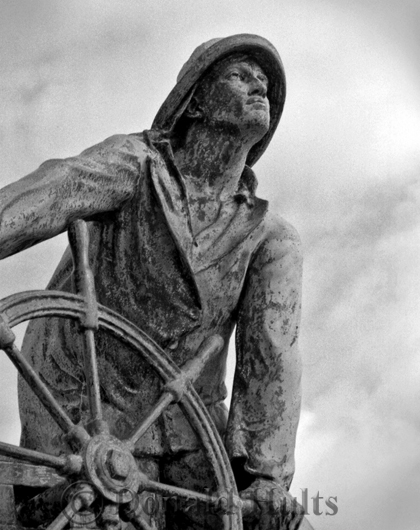 The quest to appoint an executive director of the Gloucester Fisheries Commission continues, with interim Mayor Sefatia Romeo Theken saying she hopes to fill the paid position by the end of the year. The position, which has been vacant since Vito Calomo left it almost two decades ago, remains on the books and Romeo Theken and the members of the seem to be in strong agreement that the time has come to put someone back in the job.“ The Mayor said, “This would be someone not only to advocate for all of our fishermen and fishing-related industries, but enhance the profile of the city of Gloucester.” Read the rest here 09:00
The quest to appoint an executive director of the Gloucester Fisheries Commission continues, with interim Mayor Sefatia Romeo Theken saying she hopes to fill the paid position by the end of the year. The position, which has been vacant since Vito Calomo left it almost two decades ago, remains on the books and Romeo Theken and the members of the seem to be in strong agreement that the time has come to put someone back in the job.“ The Mayor said, “This would be someone not only to advocate for all of our fishermen and fishing-related industries, but enhance the profile of the city of Gloucester.” Read the rest here 09:00
D.B. PLESCHNER: Recent Fishery Study Debunked by 1,400 Years of Data
 In an article in International Business Times (August 5, 2015), Aditya Tejas quoted researcher Malin Pinsky in his recently published paper that claims smaller, faster-growing fish like sardines and anchovies are more vulnerable to population collapses than larger fish. While it’s common these days to blame the ocean’s woes on overfishing, the truth is Pinsky’s conclusions don’t paint a complete picture. Fortunately, we do have an accurate picture and it’s definitely better than the proverbial thousand words. Read the rest here 20:56:09
In an article in International Business Times (August 5, 2015), Aditya Tejas quoted researcher Malin Pinsky in his recently published paper that claims smaller, faster-growing fish like sardines and anchovies are more vulnerable to population collapses than larger fish. While it’s common these days to blame the ocean’s woes on overfishing, the truth is Pinsky’s conclusions don’t paint a complete picture. Fortunately, we do have an accurate picture and it’s definitely better than the proverbial thousand words. Read the rest here 20:56:09
Being ignored at the Council or being publicly called an “asshole” by the Council Chairman doesn’t often make the news
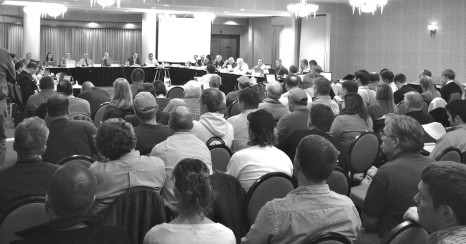 Catch Shares Take Toll Council Called To Task – At the April New England Fishery Management Council meeting in Mystic, Conn., a dozen university students from New England, members of fishing families, other fishing organizations, and community organizer Brett Tolley were in attendance. About a dozen people among this group wore orange “Who Fishes Matters” T-shirts. Continue reading An Open Letter to Tom Nies from a Fishing Family Member – Dear Mr. Nies, As Executive Director of the New England Fishery Management Council you should know how fishermen and the public experience the Council’s so-called “democratic process.” Read the letter here 18:10
Catch Shares Take Toll Council Called To Task – At the April New England Fishery Management Council meeting in Mystic, Conn., a dozen university students from New England, members of fishing families, other fishing organizations, and community organizer Brett Tolley were in attendance. About a dozen people among this group wore orange “Who Fishes Matters” T-shirts. Continue reading An Open Letter to Tom Nies from a Fishing Family Member – Dear Mr. Nies, As Executive Director of the New England Fishery Management Council you should know how fishermen and the public experience the Council’s so-called “democratic process.” Read the letter here 18:10
Four men charged in Anacortes crab poaching case
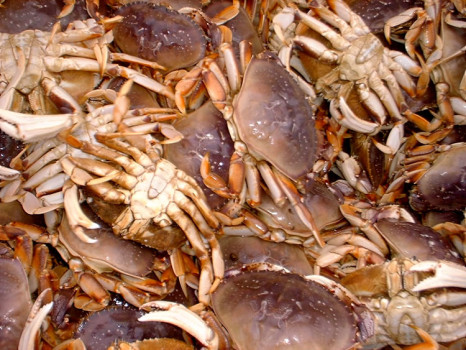 Four Anacortes men are facing criminal charges in an illegal crabbing case the state Department of Fish & Wildlife has been investigating for months. In mid-April, Fish & Wildlife authorities seized property believed to be connected to the case from multiple homes in the city. They are accused of organizing crab poaching in Similk Bay. According to a Fish & Wildlife probable cause record, 38-year-old Ricky Lee Guttormson, 24-year-old Hank Berent Knutson, 19-year-old Logan Allan Eby and 45-year-old James Emmett Montour were involved in harvesting and selling Dungeness crab to undercover officers. Read the rest here 17:07
Four Anacortes men are facing criminal charges in an illegal crabbing case the state Department of Fish & Wildlife has been investigating for months. In mid-April, Fish & Wildlife authorities seized property believed to be connected to the case from multiple homes in the city. They are accused of organizing crab poaching in Similk Bay. According to a Fish & Wildlife probable cause record, 38-year-old Ricky Lee Guttormson, 24-year-old Hank Berent Knutson, 19-year-old Logan Allan Eby and 45-year-old James Emmett Montour were involved in harvesting and selling Dungeness crab to undercover officers. Read the rest here 17:07
Fishing Vessel Sinks, Spills Oil in Alaska
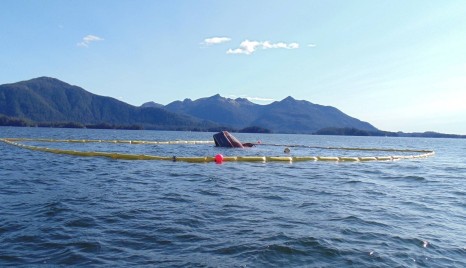 A 58-foot fishing vessel ran aground, sunk and spilled oil in Sitka, Alaska, according to the U.S. Coast Guard. No injuries have been reported, and there have been no confirmed reports of impacts to wildlife. The fishing vessel Pacific Venture, a 58-foot seiner, ran aground Tuesday evening and subsequently rolled over around 2 a.m. Wednesday, sinking in approximately 25 feet of water in vicinity of The Twins, roughly half a mile off the mouth of the Indian River in Sitka. Read the rest here 16:16
A 58-foot fishing vessel ran aground, sunk and spilled oil in Sitka, Alaska, according to the U.S. Coast Guard. No injuries have been reported, and there have been no confirmed reports of impacts to wildlife. The fishing vessel Pacific Venture, a 58-foot seiner, ran aground Tuesday evening and subsequently rolled over around 2 a.m. Wednesday, sinking in approximately 25 feet of water in vicinity of The Twins, roughly half a mile off the mouth of the Indian River in Sitka. Read the rest here 16:16
Coast Guard assists fishing vessel 50 miles from Portsmouth, NH
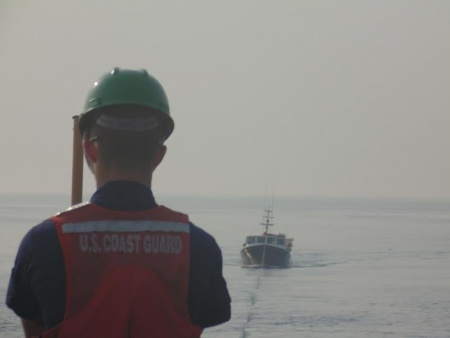 The crew of the Coast Guard Cutter Escanaba and a 47-foot Motor Life Boat crew from Station South Portland, Maine, rescued four people Thursday who were aboard a disabled fishing vessel 50 miles east of Portsmouth, New Hampshire. The captain of the 45-foot fishing vessel Danny Boy, homeported out of Portland, Maine, used a VHF-16 radio to contact watchstanders at Coast Guard Sector Northern New England Command Center Thursday at about 1:15 a.m. reporting Danny Boy was disabled, possibly due to a lack of fuel. Read the rest here 15:30
The crew of the Coast Guard Cutter Escanaba and a 47-foot Motor Life Boat crew from Station South Portland, Maine, rescued four people Thursday who were aboard a disabled fishing vessel 50 miles east of Portsmouth, New Hampshire. The captain of the 45-foot fishing vessel Danny Boy, homeported out of Portland, Maine, used a VHF-16 radio to contact watchstanders at Coast Guard Sector Northern New England Command Center Thursday at about 1:15 a.m. reporting Danny Boy was disabled, possibly due to a lack of fuel. Read the rest here 15:30
Bad Fraser River sockeye run has salmon watchers worried
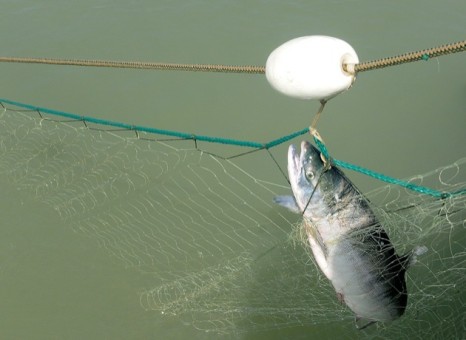 The latest estimate pegs the run size at 2.4 million salmon, barely a third of the 6.8 million mid-range projection of fishery managers. Commercial fishing that was anticipated for August never happened because of the low returns. About 150,000 sockeye have been taken in First Nations food fisheries. “We don’t have the abundance we were expecting,” said Jennifer Nener, Lower Fraser area director for DFO. Last summer, 1.7 million late-run sockeye that were counted as having gone upriver never reached the spawning beds and Taylor fears a repeat is in store. Read the rest here 14:52
The latest estimate pegs the run size at 2.4 million salmon, barely a third of the 6.8 million mid-range projection of fishery managers. Commercial fishing that was anticipated for August never happened because of the low returns. About 150,000 sockeye have been taken in First Nations food fisheries. “We don’t have the abundance we were expecting,” said Jennifer Nener, Lower Fraser area director for DFO. Last summer, 1.7 million late-run sockeye that were counted as having gone upriver never reached the spawning beds and Taylor fears a repeat is in store. Read the rest here 14:52
Nova Scotia lobster, or ‘Boston Lobster’ in China, could be rebranded
 With Canadian lobster sales in China at record levels, a major Nova Scotia exporter is trying rebrand the tasty crustacean to overcome its generic name in China: “Boston lobster.” “We all know Canadian lobster is better quality than lobster from the U.S. side,” says Jack Liu, of Zoneco, a large Chinese seafood company that has bought into the Nova Scotia lobster industry. “It’s stronger, the meat is fuller. The yield is high, there is more meat inside. “The first company in the Chinese market was American. “Boston lobster” has, as a result,,, Read the rest here 12:51
With Canadian lobster sales in China at record levels, a major Nova Scotia exporter is trying rebrand the tasty crustacean to overcome its generic name in China: “Boston lobster.” “We all know Canadian lobster is better quality than lobster from the U.S. side,” says Jack Liu, of Zoneco, a large Chinese seafood company that has bought into the Nova Scotia lobster industry. “It’s stronger, the meat is fuller. The yield is high, there is more meat inside. “The first company in the Chinese market was American. “Boston lobster” has, as a result,,, Read the rest here 12:51
A Fish Jizzed on President Obama’s Shoes
As part of his visit to Alaska, Barack Obama made a trip to the far-north fishing village of Dillingham, where a salmon squirted “milt” onto his shoes. That’s a “sperm-containing fluid.” Yup, that fish essentially splooged all over the President’s shoes. While getting a demo from a local fisherwoman, Obama informed the reporters tagging along that something had landed on his shoes and noted that, “Generally you don’t want fish spawning on your feet.” He said his guide told him that the fish was just “happy to see me.” Take it down a notch or two, fish. link 12:02
Pew threatens to get Pacific bluefin tuna banned from international trading
 An international body that monitors fisheries in most of the Pacific Ocean ended a meeting in Japan on Thursday without agreement on fresh measures to protect the dwindling bluefin tuna. The lack of a required three-quarters quorum prevented any agreement, since representatives from China, the Cook Islands, Vanuatu and the Philippines did not attend. So any decisions on new long-term measures were pushed back to 2016, the Japanese Fisheries Agency said. Further inaction would likely prompt efforts by conservationists to get Pacific bluefin tuna banned from international trading, said a statement by The Pew Charitable Trusts, Read the rest here 11:27
An international body that monitors fisheries in most of the Pacific Ocean ended a meeting in Japan on Thursday without agreement on fresh measures to protect the dwindling bluefin tuna. The lack of a required three-quarters quorum prevented any agreement, since representatives from China, the Cook Islands, Vanuatu and the Philippines did not attend. So any decisions on new long-term measures were pushed back to 2016, the Japanese Fisheries Agency said. Further inaction would likely prompt efforts by conservationists to get Pacific bluefin tuna banned from international trading, said a statement by The Pew Charitable Trusts, Read the rest here 11:27
More division on Large Vessel Protected Area (LVPA) Amendment
 The US National Marine Fisheries Service proposal to allow large US flagged longliners to fish within certain boundaries of the waters now limited to alia fishing has attracted both support and opposition. NMFS is accepting public comments until Sept. 24th on the Western Pacific Fishery Management Council’s recommendation to allow, Local longline vessel owner Edgar Feliciano says he supports amending the LVPA so that U.S. flagged longline vessels, owned and operated in American Samoa can deliver their catch to the local canneries. Read the rest here 10:24
The US National Marine Fisheries Service proposal to allow large US flagged longliners to fish within certain boundaries of the waters now limited to alia fishing has attracted both support and opposition. NMFS is accepting public comments until Sept. 24th on the Western Pacific Fishery Management Council’s recommendation to allow, Local longline vessel owner Edgar Feliciano says he supports amending the LVPA so that U.S. flagged longline vessels, owned and operated in American Samoa can deliver their catch to the local canneries. Read the rest here 10:24
Battle Over Alaska’s Bristol Bay Pits Salmon Against Gold
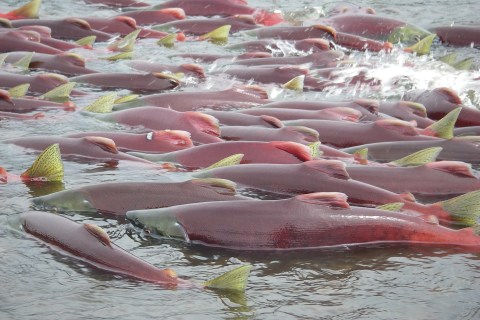 Commercial fisherman, native Alaskans and environmentalist in Bristol Bay have banded together to fight the building of the mine. Bristol Bay provides 40% of America’s wild caught seafood and $2 billion dollars in commercial fishing. It’s also the single greatest sockeye salmon fishery in the world. Right now, much of the land is protected by either the federal or state governments, but not the one piece where the potential mine would sit. Read the rest here 09:44
Commercial fisherman, native Alaskans and environmentalist in Bristol Bay have banded together to fight the building of the mine. Bristol Bay provides 40% of America’s wild caught seafood and $2 billion dollars in commercial fishing. It’s also the single greatest sockeye salmon fishery in the world. Right now, much of the land is protected by either the federal or state governments, but not the one piece where the potential mine would sit. Read the rest here 09:44
NMFS issues overfishing notice for 4 northwest salmon stocks, and North Pacific swordfish
 The federal agency in charge of managing fisheries has ruled four stocks of Pacific Northwest salmon are being overfished. The National Marine Fisheries Service and the Department of Commerce on Wednesday posted a notice in the Federal Register of the excessive fishing pressures on Chinook and Coho salmon in the Columbia River Basin and along the Washington coast. The notice, which included overfishing findings for , is meant to alert fishery managers that fishing pressures are driving salmon populations down. Read the rest here 09:10
The federal agency in charge of managing fisheries has ruled four stocks of Pacific Northwest salmon are being overfished. The National Marine Fisheries Service and the Department of Commerce on Wednesday posted a notice in the Federal Register of the excessive fishing pressures on Chinook and Coho salmon in the Columbia River Basin and along the Washington coast. The notice, which included overfishing findings for , is meant to alert fishery managers that fishing pressures are driving salmon populations down. Read the rest here 09:10
Disburse disaster aid to all active fishermen – Jan Margeson, Brewster
 A typical small-boat fisherman from Cape Cod — or anywhere in the state for that matter — has more than navigating around the tides and the wind to contend with in today’s complicated regulatory world and in the face of a changing ocean. There’s crew to pay to sustain viable communities, gear and fuel to buy to support a coastal economy, and safety equipment to update to make sure they are prepared in any emergency. Starting in October, these family fishermen will have to undertake a new added expense: paying for who count the fish they harvest and those they have to throw back. Read the rest here 08:38
A typical small-boat fisherman from Cape Cod — or anywhere in the state for that matter — has more than navigating around the tides and the wind to contend with in today’s complicated regulatory world and in the face of a changing ocean. There’s crew to pay to sustain viable communities, gear and fuel to buy to support a coastal economy, and safety equipment to update to make sure they are prepared in any emergency. Starting in October, these family fishermen will have to undertake a new added expense: paying for who count the fish they harvest and those they have to throw back. Read the rest here 08:38
Hubbs-SeaWorld is partnering with private investment firm to create the largest fish farm in America
 Don Kent peers into a water tank about the size of a backyard swimming pool and watches as a school of 10 yellowtails swim by, each about 4 feet long. “There are some big guys in there. There they come,” he said. “That’s a big fish right there.” I ask if he has names for them. “I try not to have names for things I eat,” he said. Kent won’t be eating these fish, but he hopes we’ll all be chowing down on their offspring in a few years. Kent is president and CEO of the Hubbs-SeaWorld Research Institute, a research nonprofit partially funded by SeaWorld. Hubbs-SeaWorld is partnering with a private investment firm to create the largest fish farm in America. The proposed aquaculture project would be built 4 miles off San Diego’s coast. Video, Read the rest here 22:21
Don Kent peers into a water tank about the size of a backyard swimming pool and watches as a school of 10 yellowtails swim by, each about 4 feet long. “There are some big guys in there. There they come,” he said. “That’s a big fish right there.” I ask if he has names for them. “I try not to have names for things I eat,” he said. Kent won’t be eating these fish, but he hopes we’ll all be chowing down on their offspring in a few years. Kent is president and CEO of the Hubbs-SeaWorld Research Institute, a research nonprofit partially funded by SeaWorld. Hubbs-SeaWorld is partnering with a private investment firm to create the largest fish farm in America. The proposed aquaculture project would be built 4 miles off San Diego’s coast. Video, Read the rest here 22:21
Edgartown commercial fishermen continue to adjust to new realities
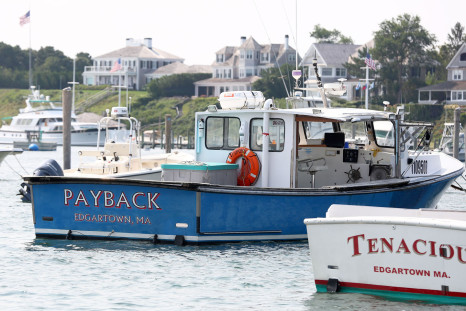 Edgartown’s commercial trap fishing industry is tough work. It is evident as much in the number of working boats and fishermen seeking conch and sea bass as it is anecdotally. Those fishermen who remain put in long days and work under strict quotas and regulations. However, fishing is all they’ve done for most of their lives, and they say they are committed to riding out what wave is left of the local industry. Read the rest here 19:00
Edgartown’s commercial trap fishing industry is tough work. It is evident as much in the number of working boats and fishermen seeking conch and sea bass as it is anecdotally. Those fishermen who remain put in long days and work under strict quotas and regulations. However, fishing is all they’ve done for most of their lives, and they say they are committed to riding out what wave is left of the local industry. Read the rest here 19:00
Lobster boat strikes the stern of schooner Lazy Jack, a 48-foot tourist and charter boat based out of Boothbay Harbor.
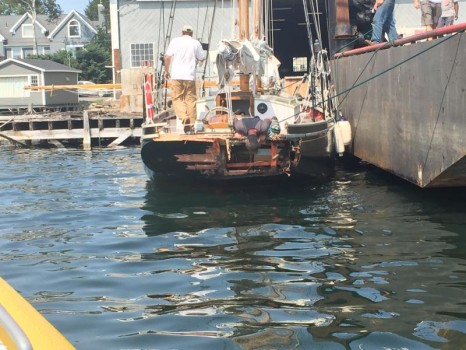 No one was hurt when a 48-foot tourist schooner was struck by a lobster boat Wednesday afternoon near Squirrel Island in Boothbay Harbor. The Lazy Jack, a wooden sailboat that operates out of Boothbay Harbor, sent out a distress call about 1:06 p.m. Wednesday, said U.S. Coast Guard Petty Officer Kurt Hein. The schooner was struck in the stern and sustained extensive damage, but was able to limp back to port with a Coast Guard escort, Hein said. Several people were evacuated from the schooner onto a nearby commercial vessel that heard the distress call,,, Read the rest here 16:21
No one was hurt when a 48-foot tourist schooner was struck by a lobster boat Wednesday afternoon near Squirrel Island in Boothbay Harbor. The Lazy Jack, a wooden sailboat that operates out of Boothbay Harbor, sent out a distress call about 1:06 p.m. Wednesday, said U.S. Coast Guard Petty Officer Kurt Hein. The schooner was struck in the stern and sustained extensive damage, but was able to limp back to port with a Coast Guard escort, Hein said. Several people were evacuated from the schooner onto a nearby commercial vessel that heard the distress call,,, Read the rest here 16:21
Canadian Workers’ compensation fisheries rate to dive 19%
 The Workers’ Compensation Board has reduced its in 2016, citing improved safety measures and awareness. Next year’s rate has been set at $6.51 per $100 of payroll, a drop of 19 per cent from 2015. Last year’s $8.06 rate was the highest for the industry, a direct result of a difficult 2013 when eight people perished in fishing tragedies. Those deaths led to the formation of the Safe at Sea Alliance, and as a result the number of days lost due to injury dropped 34 per cent the following year. Read the rest here 13:10
The Workers’ Compensation Board has reduced its in 2016, citing improved safety measures and awareness. Next year’s rate has been set at $6.51 per $100 of payroll, a drop of 19 per cent from 2015. Last year’s $8.06 rate was the highest for the industry, a direct result of a difficult 2013 when eight people perished in fishing tragedies. Those deaths led to the formation of the Safe at Sea Alliance, and as a result the number of days lost due to injury dropped 34 per cent the following year. Read the rest here 13:10






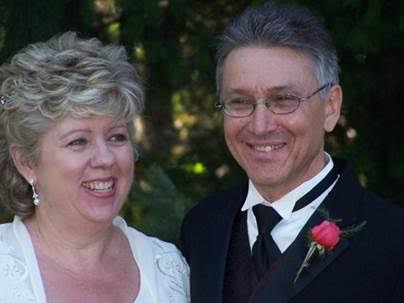 John established the
John established the  A local fish conservation authority is upset federal officials opened a coastal commercial fishery for sockeye salmon, a move which it says goes against previous decisions “We decided in the pre-season to put measures in place to ensure that stocks of concern, specifically Kitwanga sockeye, Lake Babine river sockeye, chum stock, steelhead stocks, would be protected. And that there wouldn’t be any late season openings, and the minister signed off on that in the integrated fisheries management plan,” said Cleveland. But according to federal fisheries officials, the surge in sockeye was a legitimate reason to allow a fishery.
A local fish conservation authority is upset federal officials opened a coastal commercial fishery for sockeye salmon, a move which it says goes against previous decisions “We decided in the pre-season to put measures in place to ensure that stocks of concern, specifically Kitwanga sockeye, Lake Babine river sockeye, chum stock, steelhead stocks, would be protected. And that there wouldn’t be any late season openings, and the minister signed off on that in the integrated fisheries management plan,” said Cleveland. But according to federal fisheries officials, the surge in sockeye was a legitimate reason to allow a fishery. 


























